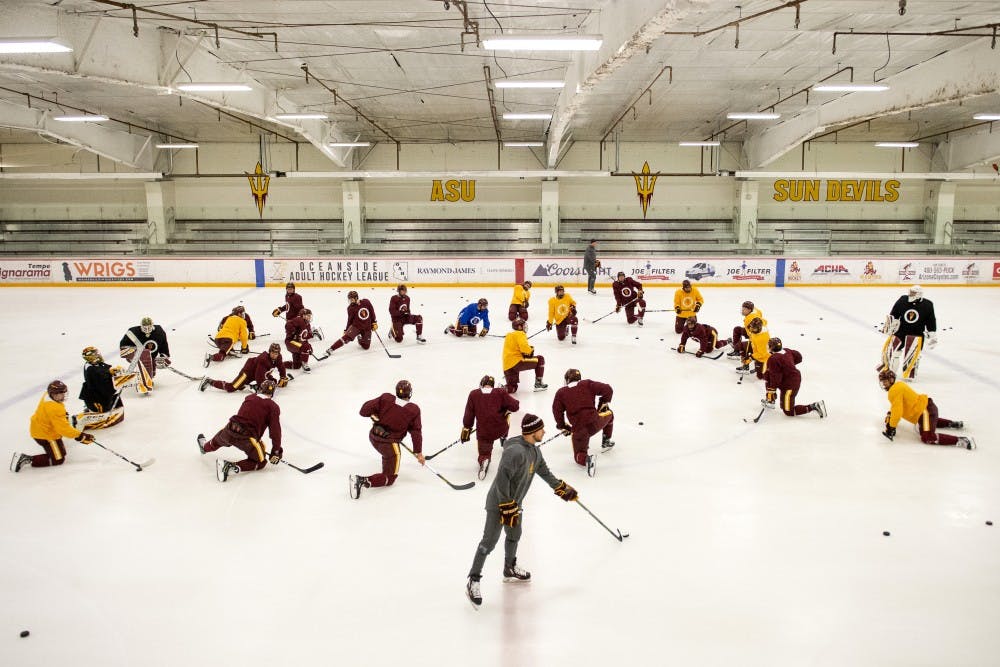Bell Let's Talk Day, a campaign created by Canadian communication company Bell to raise money in spreading awareness for mental health in Canada, is being celebrated Thursday by hockey teams in leagues across North America.
Several individuals within ASU hockey place a strong emphasis on valuing mental health and advocating for awareness of mental health issues, especially during the COVID-19 pandemic and the team's road-only season.
ASU junior forward PJ Marrocco is pleased with how much progress the movement has made for his home country of Canada and how the hockey community has aided in that push.
"For any major issue, whether it’s the mental health or just like we saw this past summer with Black Lives Matter — the movements that the NHL does, it’s amazing to see,” Marrocco said.
Every time #BellLetsTalk is tweeted on Twitter or their official video is watched on Facebook, Instagram, YouTube or TikTok, Bell donates 5 cents toward mental health initiatives.
Since 2010, the Bell Let's Talk campaign has garnered more than 1.1 billion interactions and raised more than $113 million for mental health initiatives.
With the deaths of several NHL players in the early 2010s due to mental illnesses, depression and painkiller addiction in the cases of Derek Boogaard, Wade Belak, and Rick Rypien, respectively, the NHL and other hockey teams have since made strong pushes to advocate for ending the stigma around mental health.
Junior goaltender Evan DeBrouwer said people often forget the passion men and women pour into their sport and the emotions they feel when they are not performing up to their expectations.
"To athletes, it’s not just a game, it’s not about the money, it’s so much more than that," DeBrouwer said. "When things aren’t going well, I don’t think people realize how hard athletes can take it and how mentally draining it can be on them and how much it can affect their life and their mental health."
The COVID-19 pandemic has exacerbated mental health issues for some student-athletes. An NCAA Student-Athlete well-being survey from May 2020 that surveyed over 37,000 student-athletes across the country found that more than 25% of participants said they experienced "feeling sadness and a sense of loss," and one in 12 participants reported feeling depressed to the point that it had been "difficult to function 'constantly' or 'most every day.'"
"The pandemic has been tough on everybody," DeBrouwer said. "I think mental health is a big part of that. It’s a crazy time this year and a lot of people aren’t able to do what they enjoy doing most, but we are lucky enough that we get to play hockey and do the thing we love."
Though the pandemic has continued to surge in the U.S., ASU was determined to play hockey during the 2020-21 school year and is now through 20 of the 28 scheduled games of its season.
While the team is glad to be playing a season — one that has been entirely on the road with most of their time spent in hotel rooms and on buses — the team understands the importance of mental health, especially given its constant travel.
"Mental health is paramount now more than ever for so many reasons," head coach Greg Powers said. "This is a difficult task our student-athletes are being asked to take on so the way they approach every day looking at each day as an opportunity and a blessing is key to getting through this season."
Marrocco and DeBrouwer both credit their teammates for being able to help lift them up both with respect to this season's play and on a personal level over the past several months.
"More lately than ever, mental health has definitely been more noticed, and I think it’s awesome that people are taking initiative," Marrocco said. "I think the biggest thing with us right now is we are all so closed and tight that we are always there for each other and I think that really helps us."
DeBrouwer, in particular, who noted he has not been performing as he expected this season, acknowledges the importance of mental health and doing one's best to be there for friends, teammates and family.
"The thing about mental health is that it doesn’t matter how much you have; you fall down a dark path and get down on yourself and you can’t climb out of it and you need help," DeBrouwer said. "It’s not something that’s obvious, it’s not something that you can just see on someone. It’s something that you need to pay attention to ... you never realize what (someone is) going through until you start paying attention to it."
Reach the reporter at aklatsky@asu.edu and follow @averyklatsky on Twitter.
Like The State Press on Facebook and follow @statepress on Twitter.
Continue supporting student journalism and donate to The State Press today.




